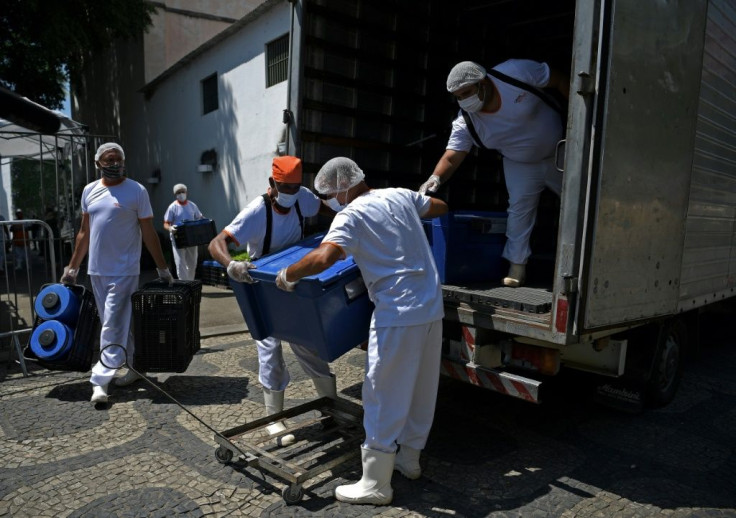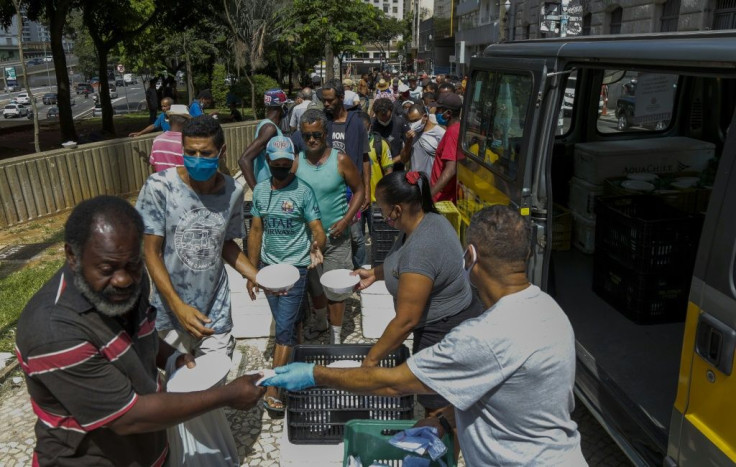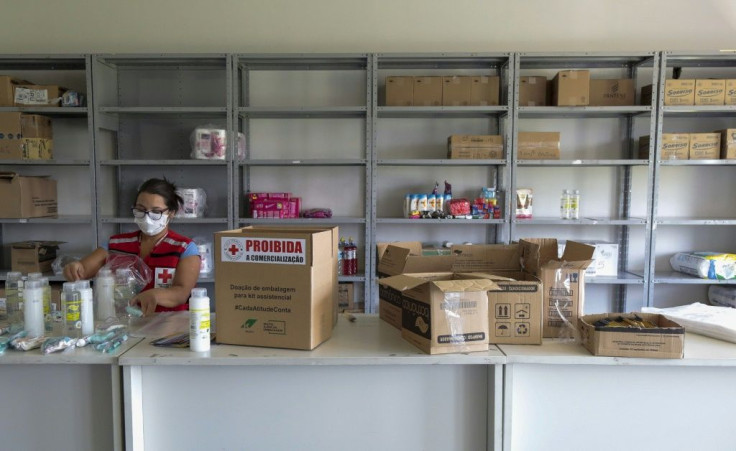In Food-rich Brazil, People Go Hungry As Pandemic Rages
The lines of homeless and other needy people waiting for free meals in the streets of Brazil are growing longer as the Covid-19 pandemic rages out of control.
In downtown Sao Paulo, Miguel da Silva clutches a sealed package containing rice, vegetables and meat or fish after lining up with some 300 other people, most of them panhandlers.
"It is better to come here than to ask for money" in the streets, said da Silva, 70, who says his pension has been held up by the government and spends what little he earns on his rent.
Under the crushing sun of Rio de Janeiro, a man named Mario Lima is also waiting for a food handout, along with hundreds of elderly people, pregnant women and homeless folk. For many, it is their only meal of the day.
"Everything is expensive. If I were to buy the food they are giving out here, it would cost more than 1,000 reals ($170) a month," said Lima, who is 72. His retirement pension is enough for his rent, a few basic expenses and nothing else.

Da Silva and Lima provide just two snapshots of how Brazil is growing poorer during the Covid-19 pandemic.
The global health crisis has left more than 315,000 people dead in the country and millions unemployed, and has pushed many people into poverty and hunger, who did not know such pain before.
The pandemic is accentuating a trend seen in the last six years in Latin America's largest economy, which is one of the world's major food suppliers.

In mid-2020, the director of the World Food Program's Brazil office, Daniel Balaban, warned that Brazil was moving quickly toward returning to the world hunger map, which it left in 2014. Countries figure on that list when more than 5% of their population live in extreme poverty.
The World Bank said then that 5.4 million more Brazilians would fall into that category in 2020, for a total of 14.7 million. The total population is 212 million.
"This is clearly the scariest moment we have been through in the fight against hunger," said Rodrigo Afonso, director of an NGO called Accion Ciudadana.
Afonso said that when the organization was founded in 1993 to combat hunger, the problem was concentrated in the north and northeast of the sprawling country.
"Today, anywhere you go you will find huge numbers of families that cannot feed themselves," said Afonso, and "things are getting worse."

A poll in November by the Getulio Vargas Foundation found that nearly a third of those surveyed suffered from food insecurity.
The government of right-wing president Jair Bolsonaro, who has downplayed the pandemic, started paying a third of the population about 600 reals a month starting in April of last year. The aid was cut to 300 reals in October and eliminated in January.
That money was a big help, but the neediest people in Brazil have now been without it for three months in an economy with the highest unemployment rate in nearly a decade -- 13.5 percent as of the end of 2020 -- steadily rising prices and the most devastating chapter yet of the pandemic.
"Before the pandemic, we had things. Now we have nothing," said Silvana da Silva, 22, who used to get by recycling waste from restaurants and stores. Now they are closed because of Covid-19, and she gets her food through the Sao Paulo town hall.
Because of the swelling ranks of the new poor, city officials now give out 10,000 free meals a day, an increase of one-third.
In Rio, too, "the issue of food is one of extreme urgency," said Bruno Dauaire, the secretary of social development and human rights in the state of Rio.
"Not long ago we did not even talk about poverty and hunger in the city of Rio, and now we are confronting this issue," said Dauaire.
NGOs try to make up for governments that are struggling financially and overwhelmed by the pandemic, but they are faced with much lower donations.
"Those who help are helping less," said Claudia Carletto, secretary of human rights and citizen issues in Sao Paulo.
The Red Cross of Sao Paulo, which hands out 2,000 food baskets a day, says the cash donations it receives are down 99 percent.
"People need more help and for longer stretches of time," said Bruno Semino, head of that branch of the Red Cross.
The lack of donations, he said, "has a major impact on our operations."
In 2020, Accion de la Ciudadania used to distribute 80,000 to 100,000 food baskets a month all over Brazil. This year, it is down to 8,000 to 10,000.
"We operate where the government is absent," said Afonso of Accion Ciudadana. "Unfortunately, in recent years the government is absent from many places."
© Copyright AFP {{Year}}. All rights reserved.




















